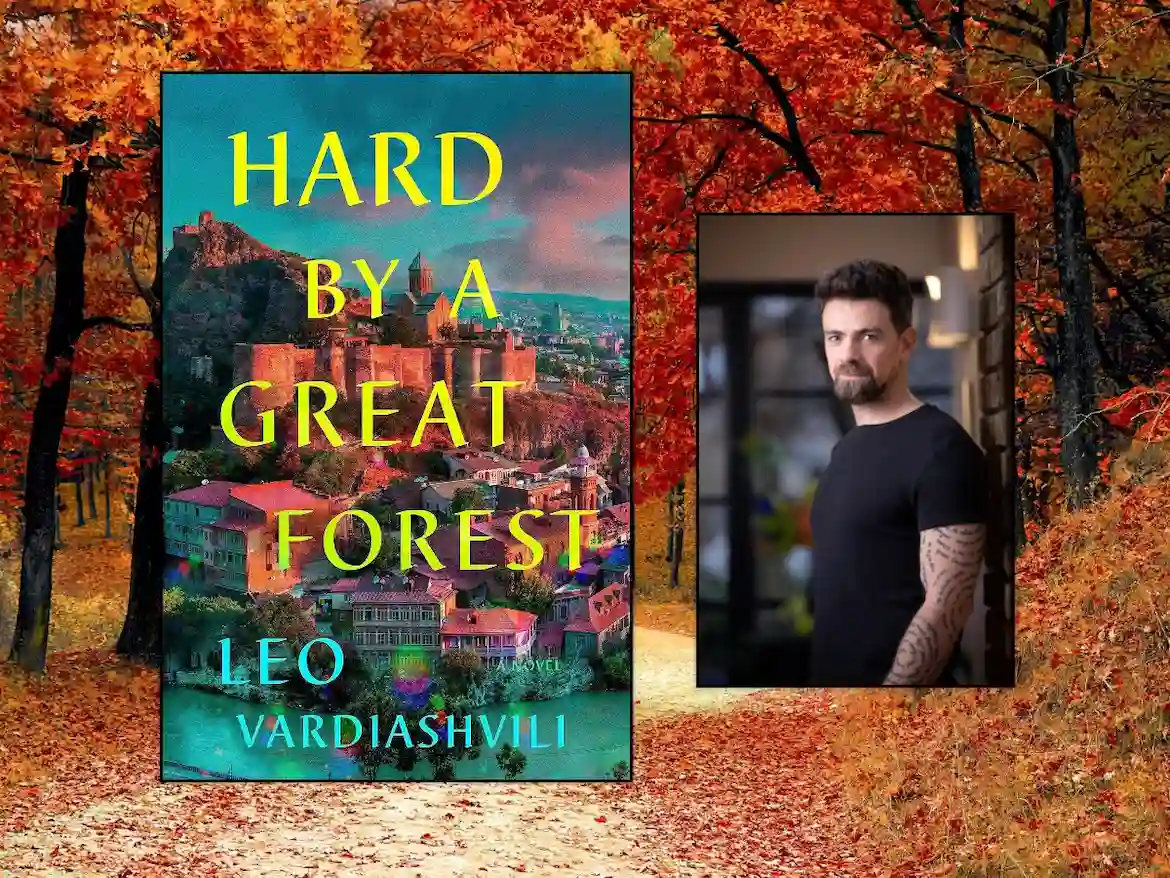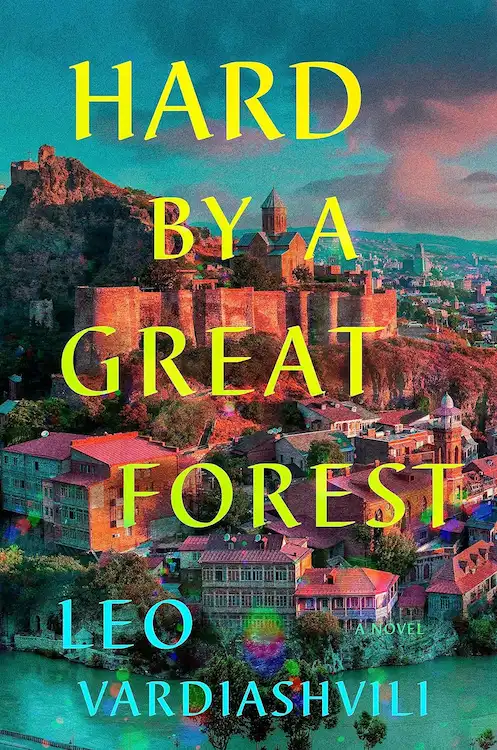In Hard by a Great Forest, amid rubble and rebuilding in a former Soviet land, one family must rescue one another and put the past to rest: a stirring novel about what happens after the fighting is over.
In This Spotlight on Hard by a Great Forest
About Hard by a Great Forest
Saba is just a child when he flees the fighting in the former Soviet Republic of Georgia with his older brother, Sandro, and father, Irakli, for asylum in England. Two decades later, all three men are struggling to make peace with the past, haunted by the places and people they left behind.
When Irakli decides to return to Georgia, pulled back by memories of a lost wife and a decaying but still beautiful homeland, Saba and Sandro wait eagerly for news. But within weeks of his arrival, Irakli disappears, and the final message they receive from him causes a mystery to unfold before them: “I left a trail I can’t erase. Do not follow it.”
In a journey that will lead him to the very heart of a conflict that has marred generations and fractured his own family, Saba must retrace his father’s footsteps to discover what remains of their homeland and its people. By turns savage and tender, compassionate and harrowing, Hard by a Great Forest is a powerful and ultimately hopeful novel about the individual and collective trauma of war, and the indomitable spirit of a people determined not only to survive, but to remember those who did not.
ISBN-13: 9780593545034
Publisher: Penguin Publishing Group
Publication date: January 30, 2024
Pages: 352
Editorial Reviews for Hard by a Great Forest
Publishers Weekly
In Vardiashvili’s spectacular debut, a refugee family reckons with their past. Irakli fled post-Soviet Georgia for London with his young sons Sandro and Saba, but was unable to afford passage for their mother, Eka. Years later, upon hearing Eka has died, Irakli guiltily returns to Georgia. Sandro follows, defying Irakli’s wishes, and contacts Saba to say he found Irakli’s trail at their old apartment. After that communication, Saba hears nothing further. Worried, he flies to Tblisi. Sandro has left graffitied clues for him on walls throughout the city, recalling their childhood scavenger hunts and supplementing Irakli’s own trail of breadcrumbs, which includes pages from his unpublished play.
In the capital’s neglected and overgrown botanical garden, which now resembles a dark forest from the Brothers Grimm, Saba must contend with marauding wolves and a hungry tiger escaped from the zoo. As he struggles to stay one step ahead of a corrupt detective who’s tailing him in order to nab Irakli, Saba faces many physical dangers, betrayals, and losses. In the end, he makes some difficult renunciations that signal his deepening maturity.
The tense plot ups the ante from one narrow escape to the next, and Vardiashvili layers his seamless blend of genres (police thriller, fairy tale quest, coming-of-age story) with lush depictions of Georgia’s landscape, culture, and resilient people. This will leave readers breathless.
Kirkus Reviews
Vardiashvili’s Kafkaesque debut follows a Londoner’s dark journey home to Georgia, his native country, to search for his missing father and brother.
When Saba Sulidze-Donauri and his older brother, Sandro, came to London as children with their father, Irakli, in 1992, their mother had to stay behind in Georgia, where she died. Years later, Irakli returns to Georgia and two months later writes his sons, now young men, that he’s gone to the mountains and they should not look for him.
Sandro flies to Georgia anyway, emailing Saba that he’s found a trail to Irakli. Then Sandro’s emails stop, so Saba, an insurance salesman, also heads to Georgia. Vardiashvili, who left post-Soviet Georgia himself when he was 12, has infused his ambitious first novel with the traumatic energy of the refugee experience—Georgia’s history as a country continually invaded and destroyed is never far from Saba’s thoughts—as well as with an indefinably Eastern European sensibility combining melancholy, cynicism, and absurdist wit.
Saba is obsessed with finding Sandro and Irakli but also obsessed with the past. Although he hires a guide, the intriguing taxi driver Nodar (who almost steals the novel), he also follows a host of voices from dead relatives and friends offering advice and grievances. As he continually eludes the shadowy police authorities tracking him, his pursuit becomes an increasingly desperate cat-and-mouse mystery.
But Saba frames his hunt as a version of “Hansel and Gretel” in which he follows the trail of clue-crumbs his brother has dropped: hidden literary illusions, both playful and dark, in oblique graffiti messages and pages from a play Irakli once wrote. Saba finds himself in a world full of menace where the borders of the real and surreal blur, where wild animals that have escaped the zoo roam the countryside, and human killings occur as randomly as do moments of hope and humanity.
An unforgettable aria to a lost homeland, full of anger, sorrow, and longing.
Library Journal
Set in Georgia, the former Soviet republic, after the recent Russian occupation of South Ossetia, this part-picaresque, part-bildungsroman reinforces the theme “you can’t go home again.” Saba follows his brother Sandro to their former home in Tbilisi after Sandro goes searching for their father, Irakli. Saba follows the breadcrumbs his brother and his father left for him—a reference to the Hansel and Gretel fairy tale that inspired the novel’s title. For years Irakli had worked tirelessly to bring his late wife to their new refuge in London. Now Irakli’s guilt has driven him home to Georgia.
As Saba searches, he is guided by voices of lost family and friends. Nodar, a chain-smoking taxi driver, also guides Saba on his harrowing and sometimes humorous journey to find his own voice amidst a war-torn countryside.
VERDICT: Vardiashvili’s amazing and poignant tale of loss and resilience draws readers in with compelling descriptions of land and place. Saba encounters horrid acts of violence or their aftermath, but he also finds beauty, even magic and mystery. A remarkable debut certain to be long listed for multiple awards, if not shortlisted for several.—Faye A. Chadwell
Praise for Hard by a Great Forest
“Vardiashvili’s heartbreaking debut novel lays bare the effects that displacement can have over generations and illuminates the resilience of those who have suffered and still found their way to happiness.”—The Washington Post
“This debut novel captures both the long scars of collective trauma and the indomitable spirit of those determined to remember and survive.”—Oprah Daily, Most Anticipated Books of 2024
“Heartrending, beautifully crafted. . .Laced with humor and insights similar to those of Gary Shteyngart and Jonathan Safran Foer, this is a sweeping, ambitious, and almost unbelievably assured debut. Exploring the long shadow of trauma cast by any war, Vardiashvili’s novel pummels the reader with an emotional force that few can match.”—Booklist
“[A] spectacular debut. . .The tense plot ups the ante from one narrow escape to the next, and Vardiashvili layers his seamless blend of genres (police thriller, fairy tale quest, coming-of-age story) with lush depictions of Georgia’s landscape, culture, and resilient people. This will leave readers breathless.”—Publishers Weekly
“This novel annihilated me. I gasped, laughed, and wept my way through it. Rich with irony and animated with astonishing humanity, this tale of a young Georgian refugee’s odyssey into his birthplace to rescue family left my heart bruised and battered and aching for more.”—Khaled Hosseini, author of #1 New York Times bestseller The Kite Runner
“This novel blows open the heart of the past. It’s a mystery, it’s a picaresque, it’s a comedy, and it’s an authentic song of belonging and unbelonging. Tender and raw and funny, it’s a rattling good read about the loss of home and the primacy of story-telling. By turns political and philosophical, it introduces a fine new voice in contemporary fiction.”—Colum McCann, National Book Award-winning author of Let the Great World Spin
“A wildly charming debut—propulsive, funny, and profound.”—Elif Batuman, Pulitzer Prize finalist and bestselling author of The Idiot
“Astonishingly crafted with history, candor, beauty, grief and just a little magic. A book like no other, from an imagination like no other. Vardiashvili has written a triumph.”—Andrew Sean Greer, Pulitzer Prize-winning author of Less Is Lost
“Profoundly moving and rich with humor and heartbreak, Hard by a Great Forest mesmerized me from the very first page. It will capture your heart.”—Jean Kwok, New York Times bestselling author of Girl in Translation
About Leo Vardiashvili, Author of Hard by a Great Forest
Leo Vardiashvili was born and raised in Tbilisi, Georgia. When he was twelve, he and his family fled Georgia’s post-Soviet regime for asylum in England. He studied English literature at Queen Mary University of London.
You can find and follow Leo Vardiashvili on X (formerly Twitter). You can also see a short film interview with him on YouTube.
Other LitStack Resources
Be sure and check out other LitStack Spotlights that shine a light on books we think you should read.
As a Bookshop, BAM, Barnes & Noble, Audiobooks.com, Amazon, and Envato affiliate, LitStack may earn a commission at no cost to you when you purchase products through our affiliate links.




